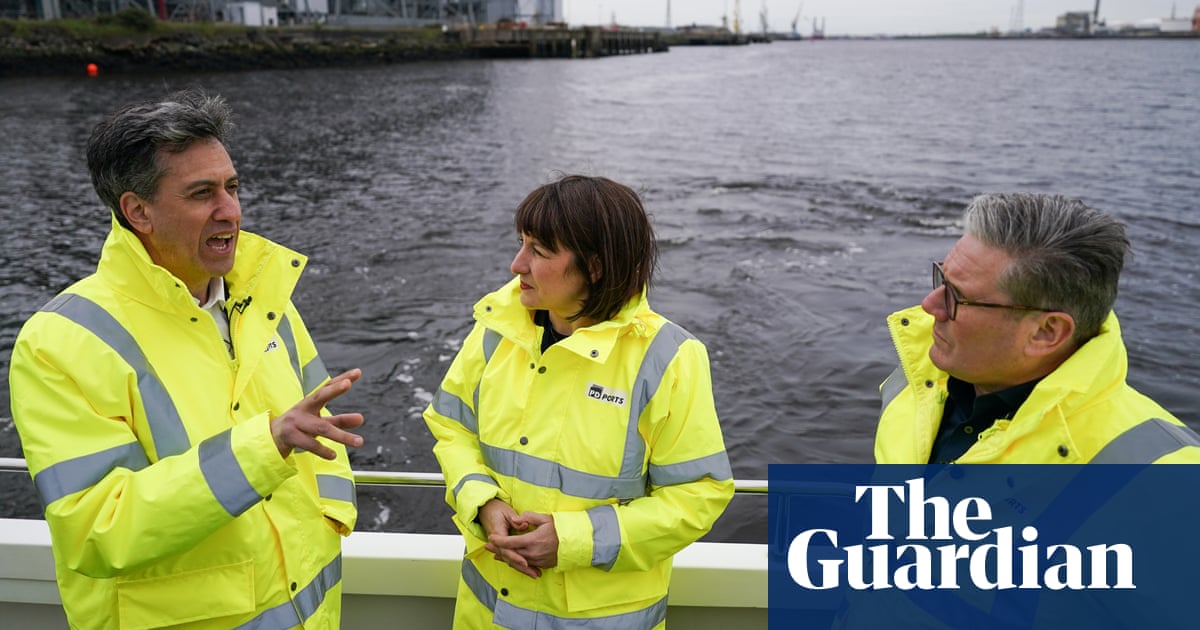Rachel Reeves is paving the way for a multibillion-pound increase in public-sector investment at the budget after the government announced plans to commit almost £22bn over 25 years to fund carbon capture and storage projects.
In what is expected to be one of the biggest green spending promises of the parliament, the chancellor, prime minister and the energy secretary, Ed Miliband, will unveil the details on a visit to the Liverpool city region on Friday declaring a “new era” for clean energy jobs.
With less than a month before the 30 October budget, Reeves said the announcement would come as one of a “drumbeat” of measures to kickstart economic growth.
The government hopes the investment will reignite Britain’s struggling heavy industry by funding two major carbon capture and storage (CCS) clusters; one in Teesside in north east England, and a second in north-west England and north Wales.
The technology is controversial because it has never been used at commercial scale in the UK before, while environmental campaigners have warned big energy firms could use it to extend the life of their fossil fuel assets.
Greenpeace said there was a danger the government was “locking ourselves into second-rate solutions”.
However, ministers and officials expect it to play a major role in the government’s climate ambitions as a vital way to reach net zero.
The prime minister will say the commitment had helped to bring in an expected £8bn of private investment by some of the world’s biggest energy companies, including BP and Norwegian energy company Equinor.
Reeves’ comments come after she hinted in her speech to Labour’s party conference in Liverpool last week that she would change the government’s fiscal rules to allow billions of pounds more in capital spending.
“We’ll set out details of the fiscal rules at the budget, but we have got to make sure we unlock that space for capital investment,” she told journalists ahead of Friday’s announcement.
Friday’s announcement comes amid fears of a fresh energy price shock triggered by an escalating Middle East conflict.
Reeves issued a warning that Britain would not be immune to the fallout from spiralling oil prices, which rose 5% on Thursday, although cautioned that the response so far on financial markets had been muted.
“There’s a risk both on inflation and on GDP. It’s something we’ll keep a close eye on .”
Carbon capture technology works by trapping emissions from power plants or factories before the emissions enter the atmosphere and contribute to the climate crisis. The emissions will be transported via gas pipes to be stored beneath the seabed.
Keir Starmer said: “Today’s announcement will give industry the certainty it needs – committing to 25 years of funding in this groundbreaking technology – to help deliver jobs, kickstart growth, and repair this country once and for all.”
Officials expect the projects to attract private sector investment of about £8bn while directly creating 4,000 jobs and supporting 50,000 jobs in the long term.
The East Coast Cluster is backed by oil companies including BP and Equinor. The HyNet North West project is being developed by the Italian oil company Eni.
Using CCS to produce “blue hydrogen” or to run gas power plants is controversial among green groups and some climate researchers because it requires a steady supply of fossil gas, which produces emissions that are not captured when it is extracted and transported.
Instead, the government should invest more in clean power sources and “green hydrogen”, which is made from water and renewable electricity using a device called an electrolyser, according to campaigners.
Doug Parr, policy director at Greenpeace UK, said: “For a government that is committed to tackling the climate crisis, £22bn is a lot of money to spend on something that is going to extend the life of planet-heating oil and gas production.
“Carbon capture may be needed for hard-to-abate sectors, such as cement production, however, hydrogen derived from gas is not low-carbon and there is a risk of locking ourselves into second-rate solutions.”
Lorenzo Sani, an analyst at Carbon Tracker, a climate thinktank, told the Guardian the government’s decision “repeats the mistakes of the previous administration” by committing new funding without first reassessing its CCS strategy.
Sani said the plan “remains anchored in outdated and overly optimistic [cost] assumptions”, which risk “squandering even more taxpayer money on carbon capture projects that are both high risk and not future proof”.
Dr Andrew Boswell, an independent researcher into the CCS industry, dismissed the investment as a “massive giveaway to the fossil fuel industry” and a “bad decision” for bills, energy security and the planet.
Britain’s initial attempt to establish a carbon capture industry began in 2009 under a Labour government. But after the Conservative victory in 2010 the £1bn funding plan faltered and was scrapped in 2015. The Conservatives went on to shortlist the two CCS projects for funding in 2021 but did not commit to the investment before they were voted out of power in July.
Miliband said: “I was proud to kickstart the industry in 2009, and I am even prouder today to turn it into reality.
“On Monday, 150 years of coal in this country came to an end. Today, a new era begins. By securing this investment, we pave the way for securing the clean energy revolution that will rebuild Britain’s industrial heartlands.”

